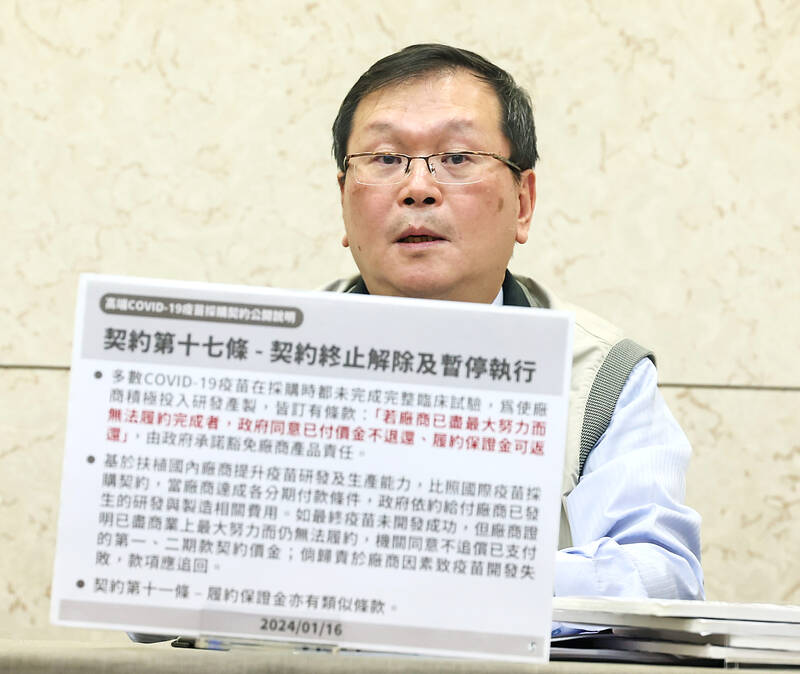The Centers for Disease Control (CDC) yesterday published its COVID-19 vaccine procurement contract with Taiwan-based Medigen Vaccine Biologics Corp (高端疫苗) after the company’s board of directors agreed to an early disclosure of the agreement.
The Chinese Nationalist Party (KMT) had repeatedly asked the CDC to publish the contract, saying the government might be concealing secrets from the public.
Premier Chen Chien-jen (陳建仁) last week said the government could not unilaterally disclose the contract due to a confidentiality agreement, but that it was negotiating with Medigen in hopes that it would agree to an early disclosure.

Photo: CNA
At an impromptu news conference yesterday afternoon, CDC Director-General Chuang Jen-hsiang (莊人祥) said Medigen informed the agency at 3:30pm yesterday that its board of directors had agreed to let it publish the contract.
Chuang said the CDC and Medigen had signed a procurement contract and a confidentiality agreement, ensuring that both sides do not disclose the details of the contract, which is in line with international commercial practices, and that many governments have also signed confidentiality agreements when they signed procurement contracts with vaccine producers.
The procurement contract was signed on May 28, 2021, according to the Public Construction Commission’s procurement contract template, but it lacked a commercial confidentiality agreement, so both sides had an oral contract to adhere to non-disclosure obligations, he said.
Medigen on June 8, 2021, asked to sign a supplementary confidentiality agreement to prevent leaks of ingredients, which was signed on July 19, 2021, he added.
According to the confidentiality agreement with Medigen, the confidentiality period was set at five years after the date of signing, but to bolster the public’s confidence, both sides agreed to disclose the information earlier, he said.
There is no agreement to keep the contract “sealed for 30 years” as some politicians have claimed, he said.
Confidentiality agreements for vaccine procurement are not new, as the CDC also signed a seven-year confidentiality agreement with Novartis when it purchased the influenza A (H1N1) monovalent vaccine in 2009, and agreements with different confidentiality periods were signed with AstraZeneca, Pfizer-BioNTech, and Moderna for their COVID-19 vaccines, he said.
Regarding vaccine prices, he said that when the Central Epidemic Command Center (CECC) announced in November 2020 that it planned to spend NT$11.5 billion (US$366.34 million) to purchase 15 million doses — or about NT$700 per dose — it was an estimated price that did not include cold chain logistics and other costs.
During the bargaining process from February to May 2021, Medigen offered a quote of NT$950 per dose, and the CDC negotiated the price to NT$881 apiece for single-dose vials and NT$810 for multi-dose vials, Chuang said.
The company must also the distribute the vaccine to no fewer than 200 locations, and be responsible for the vaccines from inspection to shipping, and the cost of disposal and other operating fees, he said.
The company had previously disclosed the prices of the vaccine and now that the full contract has been published with the consent of both sides, there is no breach of contract and it would not affect the CDC’s credit in purchasing vaccines in future, he said.
The 58-page vaccine procurement contract has been published on the CDC’s official Web site.

Chinese Nationalist Party (KMT) Chairman Eric Chu (朱立倫), spokeswoman Yang Chih-yu (楊智伃) and Legislator Hsieh Lung-chieh (謝龍介) would be summoned by police for questioning for leading an illegal assembly on Thursday evening last week, Minister of the Interior Liu Shyh-fang (劉世芳) said today. The three KMT officials led an assembly outside the Taipei City Prosecutors’ Office, a restricted area where public assembly is not allowed, protesting the questioning of several KMT staff and searches of KMT headquarters and offices in a recall petition forgery case. Chu, Yang and Hsieh are all suspected of contravening the Assembly and Parade Act (集會遊行法) by holding

PRAISE: Japanese visitor Takashi Kubota said the Taiwanese temple architecture images showcased in the AI Art Gallery were the most impressive displays he saw Taiwan does not have an official pavilion at the World Expo in Osaka, Japan, because of its diplomatic predicament, but the government-backed Tech World pavilion is drawing interest with its unique recreations of works by Taiwanese artists. The pavilion features an artificial intelligence (AI)-based art gallery showcasing works of famous Taiwanese artists from the Japanese colonial period using innovative technologies. Among its main simulated displays are Eastern gouache paintings by Chen Chin (陳進), Lin Yu-shan (林玉山) and Kuo Hsueh-hu (郭雪湖), who were the three young Taiwanese painters selected for the East Asian Painting exhibition in 1927. Gouache is a water-based

Taiwan would welcome the return of Honduras as a diplomatic ally if its next president decides to make such a move, Minister of Foreign Affairs Lin Chia-lung (林佳龍) said yesterday. “Of course, we would welcome Honduras if they want to restore diplomatic ties with Taiwan after their elections,” Lin said at a meeting of the legislature’s Foreign Affairs and National Defense Committee, when asked to comment on statements made by two of the three Honduran presidential candidates during the presidential campaign in the Central American country. Taiwan is paying close attention to the region as a whole in the wake of a

OFF-TARGET: More than 30,000 participants were expected to take part in the Games next month, but only 6,550 foreign and 19,400 Taiwanese athletes have registered Taipei city councilors yesterday blasted the organizers of next month’s World Masters Games over sudden timetable and venue changes, which they said have caused thousands of participants to back out of the international sporting event, among other organizational issues. They also cited visa delays and political interference by China as reasons many foreign athletes are requesting refunds for the event, to be held from May 17 to 30. Jointly organized by the Taipei and New Taipei City governments, the games have been rocked by numerous controversies since preparations began in 2020. Taipei City Councilor Lin Yen-feng (林延鳳) said yesterday that new measures by